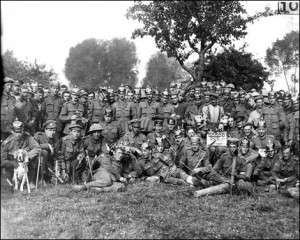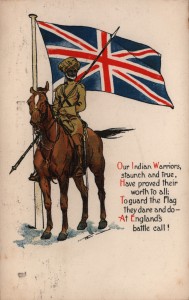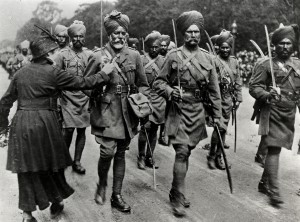This is a guest post by Louise Hardwick of the University of Birmingham, who attended our recent event on the Black Community and the Great War. It originally appeared on her own blog.
In January 2015, I attended an event on Britain’s Black Community and the Great War, which was organised by colleages at Birmingham and Nottingham’s WW1 Engagement Centres (funded through the AHRC) for researchers and members of the wider community.
 The event was held at the Library of Birmingham (see photo), one of the city’s flagship buildings and a really important community space.
The event was held at the Library of Birmingham (see photo), one of the city’s flagship buildings and a really important community space.
It was fantastic to meet a range of speakers from community groups in the Midlands area and to learn more about figures such as the footballer Walter Tull who fought and died in the First World War. I discussed my work on Zobel, and the event has spurred me on to think about Joseph Zobel, the French Caribbean and WW1.
Zobel’s La Rue Cases-Nègres (Black Shack Alley) is about a young Martinican boy, José Hassam, a character who is modelled on Joseph Zobel himself. Early in the novel, José’s grandmother comments that she never met José’s father, as he left Martinique to fight in World War One:
I never set eyes on that man called Eugène who is your father and he never set eyes on you either. You weren’t born yet when he was caught to go and fight in France. Since the war is reported to be over, no Eugène. (p. 25)
J’ai jamais vu la tête de cet homme-là qui s’appelait Eugène et qui est ton père; et lui-même t’a jamais vu non plus. T’étais pas né qu’on l’a attrapé pour l’envoyer faire la guerre en France. Depuis le jour qu’on dit que la guerre est finie, point d’Eugène. (p. 44)
The grandmother’s perspective is interesting: she considers that Eugène was ‘caught’ and ‘sent’ to fight a long way away from his home and his new family in France. Military service had become obligatory for French Caribbean citizens in August 1913, and the news of World War One reached the islands a year later in August 1914. Joseph Zobel was born the following year, during WW1, in 1915.
The grandmother sounds resentful, which comes as little surprise, as Eugène’s departure left her own daughter a single mother. As a result, José is mainly raised by his grandmother, so that his mother can work to earn a living.
What is also interesting, is that the war is over, but Eugène has not returned. Was he killed, or has he chosen to stay on in Europe…? We never know… This is all we ever learn about José’s absent father. The novel nonetheless shows how José’s life was affected by the Great War, like thousands of other Caribbean children’s lives.
* * *
Almost 13,000 French Caribbean men were called up or volunteered to fight in World War One, and many died fighting at the fronts. Martinique and Guadeloupe also contribute to the national funds raised in order for France to fight.
Here, you can see a black-and-white photograph of Martinique’s ‘Monument to the Dead’ (Monument aux morts) which commemorates those who fell in the Great War:
http://www.patrimoines-martinique.org/ark:/35569/a0112730601883VQwJ5
A man from Guadeloupe, Captain Camille Mortenol (1959-1930), who was the son of former slaves, was one of the rare Caribbean officers in the French army during World War One. Mortenol had also been the first ‘homme de couleur’ (man of colour) to enter the French ‘Ecole Polytechnique’, the elite national military school which is the French equivalent of Sandhurst in the UK.


 During the event there will be a series of presentations and participants will have the opportunity to share their own work, meet others working on projects, and discuss with staff from the WW1 Engagement Centres how to develop or expand projects or research.
During the event there will be a series of presentations and participants will have the opportunity to share their own work, meet others working on projects, and discuss with staff from the WW1 Engagement Centres how to develop or expand projects or research.